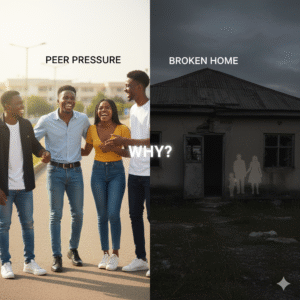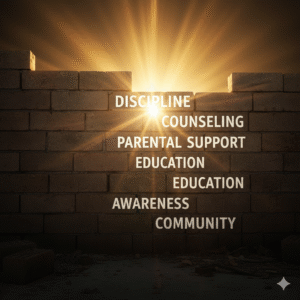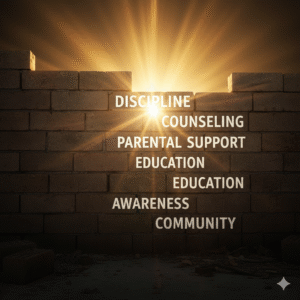What is Cultism in Civic Education? Definition, Causes & Solutions in Nigeria
Got an assignment on what is cultism in civic education: definition, causes and solution to Cultism in Nigeria? Or maybe you’re a teacher prepping a lesson note?
Let’s be honest, it’s a heavy topic. You hear the whispers in the hallways, the warnings from your parents, and the scary news headlines. But what is it, really? And why is it such a big part of your Civic Education curriculum?
It’s not just some random topic to fill your textbook. It’s a real, serious problem that affects everyone.
In simple terms, cultism is when a group of people (a “secret cult”) come together with a hidden agenda. They have secret initiations (which are often violent), secret codes, and operate outside the normal rules of society. They demand total loyalty from their members, often using fear and intimidation.
This is the opposite of the positive values in Civic Education like honesty, co-operation, and respect for the law.

What is the definition of a cultist?
Simple. A cultist is a member of one of these secret cults.
They are the individuals who have gone through the initiation and are now bound by the group’s oaths and secrets. They are the ones who carry out the group’s activities, which, in Nigeria, are very often linked to crime and violence.

Why is cultism a national problem?
This is the core of your assignment. When your teacher asks this, they don’t want just one answer. They want you to understand how deep the problem goes.
It’s not just “bad boys doing bad things.” Cultism is a national problem because it attacks our country from almost every angle. I’ve broken down the 20 biggest reasons into four simple groups.

1. It Breeds Violence, Crime, and Fear
This is the one you see on the news.
- Causes violence and killings: Rival cults fight for territory or “respect,” leading to street wars.
- Leads to loss of lives: Innocent people, not just cultists, are often caught in the crossfire.
- Breeds insecurity and fear: When cults are active, people are afraid to go out at night. Businesses close early.
- Encourages extortion and crime: Cultists often force “dues” from students or local shop owners, which is just a fancy word for stealing.
- Recruits vulnerable youth: They target young, impressionable students, often promising them protection or power.
- Causes psychological trauma: Victims of cultist attacks, and even their families, are left with deep mental scars.
2. It Disrupts Our Entire Education System
This is why it’s a major topic in your school.
- Disrupts education system: When there’s a cult clash, what happens? School gets cancelled.
- Increases school closures: In some areas, schools and universities have to shut down for weeks, messing up your academic calendar. (It’s almost as bad as an ASUU strike!)
- Causes campus instability: Students can’t focus on their studies (like preparing for WAEC or JAMB) if they are worried about their safety.
- Promotes lawlessness: It breaks down all school rules and discipline.
3. It Tears Society and Families Apart
This is the hidden, social damage.
- Destroys social values: It replaces hard work and respect with fear and “might is right.”
- Encourages drug abuse: Drug use is extremely common in these groups, which they use to fuel their violence.
- Creates social fragmentation: Neighbourhoods become divided based on which cult controls the area.
- Undermines community cohesion: People stop trusting each other.
- Breaks family structures: Imagine the pain of a family that discovers their son or daughter is a cultist. It brings shame, fear, and heartbreak.
4. It Stops Nigeria from Growing
This is the “big picture” problem.
- Hinders national development: No international company wants to invest in an area known for violence. No progress can happen when there’s no peace.
- Exposes youth to peer pressure: It creates a toxic environment where joining a cult seems “cool” or necessary.
- Linked to unemployment struggles: When young people feel there’s no job and no future, cults can seem like their only option for status or money.
- Exploits economic hardship: Cult leaders promise to “take care” of their members, preying on their poverty.
- Encourages political manipulation: This is a big one. Some politicians unfortunately use cult groups during elections as private thugs to intimidate opponents.
What are the causes of cultism?
So, why do people join? It’s not a simple answer. I tend to see the causes in two main groups: the personal reasons and the societal failures.

Group 1: Personal and Family Pressures
- Peer pressure and influence: This is the most common. Your friends are in it, and they pressure you to join to “belong.”
- Broken homes and family background: A lack of a strong, loving family or role model at home can make a young person look for a “family” on the streets.
- Desire for power and control: Some people just want to feel powerful, to be able to intimidate others.
- Need for protection and security: This is a sad one. Some students join a cult simply because they are being bullied by another cult and see it as their only way to be safe.
- Frustration and aggression: General anger about life, poverty, or failing in school can be channelled into the violence of cultism.
Group 2: Societal and Institutional Failures
- Societal moral decay: When society celebrates sudden, unexplainable wealth (“Yahoo-Yahoo,” political theft) over hard work, young people lose their way.
- Erosion of education standards: When the system is weak, with poor funding, constant strikes, and even rampant examination malpractice, students lose hope in education.
- Economic hardship and unemployment: This is a huge factor. A graduate with no job prospects is far more vulnerable to the promises of a cult.
- Lack of recreational facilities: When there are no good sports centres, libraries, or clubs, idle hands find “other” things to do.
- Political manipulation: As mentioned before, when politicians arm and protect cultists for their own gain, it makes the problem 100 times worse.
What are the five ways of preventing cultism?
Okay, so how do we stop it before it starts? Prevention is all about building a strong wall so people don’t fall in.
- Awareness Campaigns: This is what your Civic Education class is doing right now! Use media, workshops, and lectures (especially for new “Jambites” or JSS1 students) to show the real, ugly side of cultism, not the fake “power” they promise.
- Strong School Discipline: Schools must have clear, strict, and fair rules. When students know that even small offences are handled, it creates an environment where lawlessness can’t grow.
- Guidance and Counseling: This is critical. Every school needs good counsellors who students can actually talk to about pressure, family problems, or fear, without being judged or punished.
- Parental Involvement: Parents need to be… well, parents. This means monitoring their children, knowing their friends, and teaching them strong moral values from day one.
- Security Measures: School security needs to be trained to spot the signs—strange symbols, new “slangs,” or intimidation—and act before it becomes a full-blown problem.

What are the five solutions to cultism?
This is different from prevention. “Solutions” are about how we fix the problem that already exists.
- Strict Punishment: This is the hard line. The Nigerian government has laws against cultism, like the Secret Cultism (Prohibition) Law in Lagos State, which includes long jail terms. Enforcing these laws strictly, with no “godfather” to bail them out, is a major solution.
- Rehabilitation (Guidance and Counseling): You can’t just lock everyone up. We need programs to help members who want to leave (renounce). This involves psychological support, job training, and de-programming them from the cult’s mindset.
- Public Awareness & Renunciation Programs: This is a solution. Encourage public renunciations. When students see senior cultists publicly giving up, it breaks the myth of their power. Universities like the University of Lagos (UNILAG) have clear codes of conduct that make renunciation a formal process.
- Community and Religious Involvement: Local community leaders, churches, and mosques must actively preach against this and create a strong community spirit that rejects violence and provides support.
- Creating Safe and Engaging Environments: This is a long-term solution. Government and schools must provide positive alternatives. This means functional sports teams, debate clubs, tech hubs, and, most importantly, real job opportunities after graduation. If a student sees a bright future, the dark promises of a cult lose all their power.

Let’s Be Real…
I know this topic is heavy, maybe even a bit scary. But understanding it is the first step to fixing it.
Your job as a student isn’t just to get an “A” on this assignment. It’s to be one of the people who builds a better, safer school and community. Focus on your books, choose your friends wisely, and never be afraid to talk to a trusted adult if you feel pressured.
You’ve got this.
Frequently Asked Questions (FAQs)
1. Is cultism the same as a regular club? No, not at all. A regular club (like a debate club, press club, or JETS club) is open, has positive goals, and is approved by the school. A secret cult is hidden, often violent, and is illegal.
2. Is cultism only in universities? Sadly, no. While it’s most famous in universities and polytechnics, it has trickled down to secondary schools and even some primary schools in recent years. This is why it’s in your Civic Education curriculum.
3. What is the main penalty for cultism in Nigeria? It’s very serious. Under laws like the one in Lagos State, penalties can range from 15 to 21 years in prison for being a member, and even life imprisonment or death if the cult’s activities lead to murder. It is not a game.







